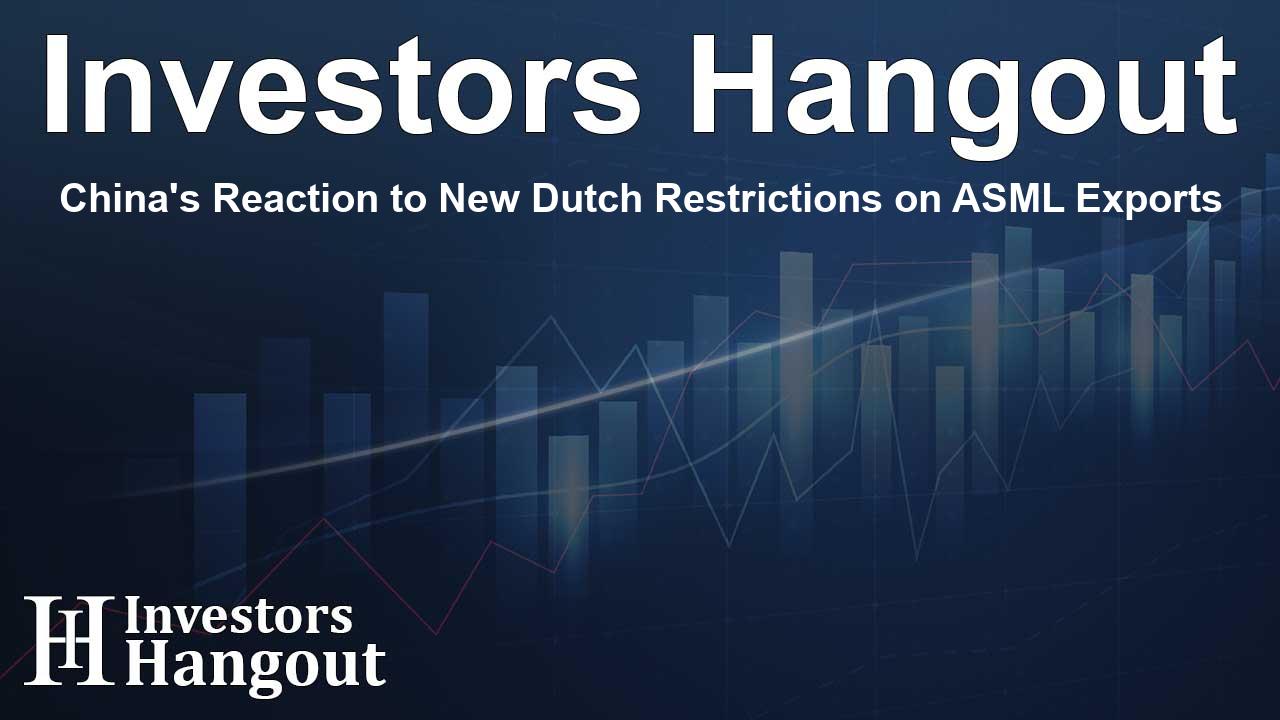China's Reaction to New Dutch Restrictions on ASML Exports

China's Discontent with Dutch Export Controls on ASML
China has voiced its dissatisfaction regarding the Dutch government's recent decision to enhance export controls on ASML chipmaking tools, an action that has stirred significant reactions from Chinese officials.
The Expansion of Export Licensing Requirements
In a directive issued on Friday, the Dutch government revealed plans to increase export licensing prerequisites for ASML's renowned 1970i and 1980i DUV (Deep Ultraviolet) immersion lithography machines. This move aligns the Netherlands with export restrictions already set forth by the United States within the last year. The decision was framed as necessary for maintaining the country’s safety.
Beijing's Response to American Pressure
The Chinese commerce ministry did not hold back in its criticism, addressing the pressure exerted by the United States on its allies, including the Netherlands and Japan, to impose export controls that limit Chinese access to advanced semiconductor technology. China has consistently expressed its strong disapproval of what it considers coercive tactics employed by the U.S. to maintain its global dominance.
Concerns Over International Cooperation
The ministry’s statement underscored a plea to the Dutch authorities, urging them not to misuse export controls and to refrain from implementing measures that might harm the cooperative efforts in the semiconductor sector between China and the Netherlands. It emphasizes the necessity of protecting the collective interests of enterprises from both nations.
The Impact on ASML and Global Markets
ASML, as the leading supplier of chipmaking equipment, finds itself caught in the geopolitical crossfire. The U.S.'s lobbying efforts have successfully limited ASML's ability to export its most advanced lithography systems to China, a market of critical importance for the company's growth and the global supply chain.
The Future of Semiconductor Cooperation
Looking ahead, the dynamics between China, the Netherlands, and the U.S. will significantly influence the semiconductor industry's landscape. The delicate balance of international trade in technology depends heavily on diplomatic relations and negotiations between these influential countries.
Frequently Asked Questions
What specific export controls did the Dutch government implement?
The Dutch government expanded export licensing requirements for ASML’s 1970i and 1980i DUV lithography tools, aligning them with U.S. restrictions.
How did China react to these new export controls?
China expressed strong dissatisfaction and criticized the Netherlands for following U.S. directives that could harm Sino-Dutch cooperation in semiconductors.
What is ASML's significance in the chipmaking industry?
ASML is the world's largest supplier of chipmaking equipment, crucial for the production of advanced semiconductors needed in various technologies.
How has U.S. pressure influenced export policies in other countries?
The U.S. has been effective in persuading its allies, including the Netherlands and Japan, to restrict exports to China, impacting global supply chains.
What are the implications of these export controls for global markets?
These export controls could significantly influence technology access and cooperation, potentially leading to a realignment of global supply chains in the semiconductor industry.
About The Author
Contact Riley Hayes privately here. Or send an email with ATTN: Riley Hayes as the subject to contact@investorshangout.com.
About Investors Hangout
Investors Hangout is a leading online stock forum for financial discussion and learning, offering a wide range of free tools and resources. It draws in traders of all levels, who exchange market knowledge, investigate trading tactics, and keep an eye on industry developments in real time. Featuring financial articles, stock message boards, quotes, charts, company profiles, and live news updates. Through cooperative learning and a wealth of informational resources, it helps users from novices creating their first portfolios to experts honing their techniques. Join Investors Hangout today: https://investorshangout.com/
The content of this article is based on factual, publicly available information and does not represent legal, financial, or investment advice. Investors Hangout does not offer financial advice, and the author is not a licensed financial advisor. Consult a qualified advisor before making any financial or investment decisions based on this article. This article should not be considered advice to purchase, sell, or hold any securities or other investments. If any of the material provided here is inaccurate, please contact us for corrections.
